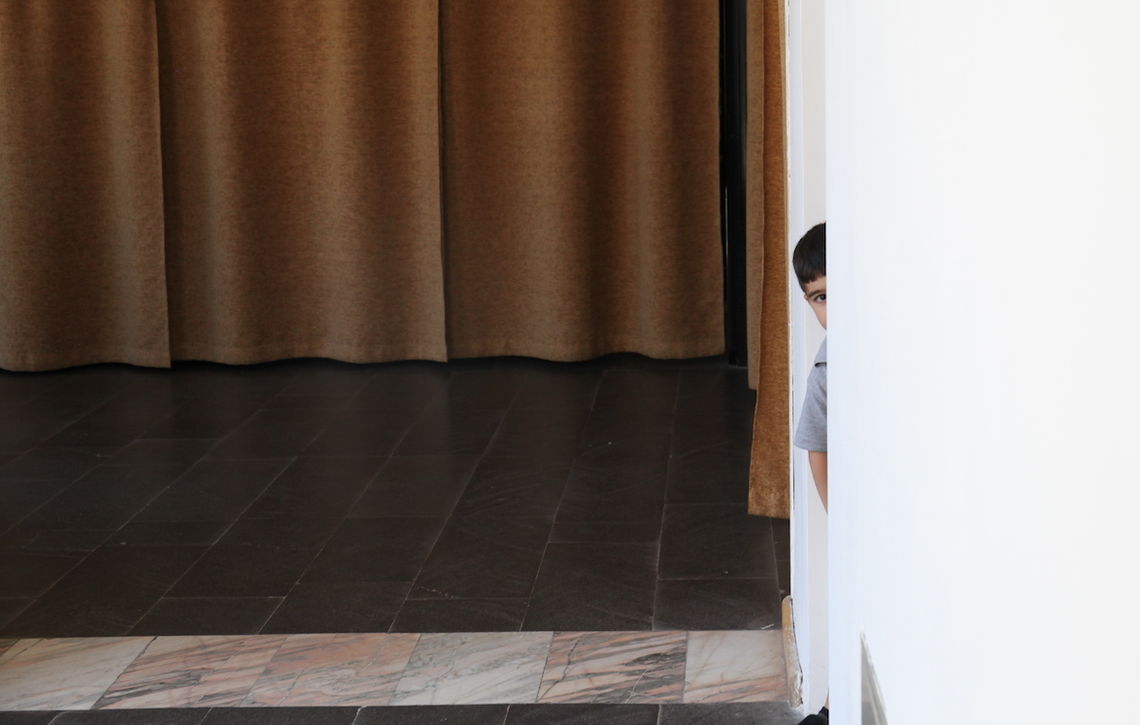
Uncle Matso is here! Uncle Matso is here!
Without waiting to give each other a turn, Mrs. Sveta’s six boys and two girls run to hug her husband. Judging by the children’s excitement, it’s hard to know who is the couple’s biological child and who isn’t.
The first thing you notice in this village situated along the borders of the communities of Kotayk (formerly Yelgovan) and Nor Gyugh in the Kotayk region are the light green and pink homes so different from other dwellings in the area. It is not only their color and architecture that makes them unique. If, in most other homes there are four to five children, in this village, each house is home to eight children.
The Kotayk SOS Children’s Village was established in 1988 following the Spitak earthquake to offer immediate aid to those children who had lost their parents. Today, over 30 years later, SOS Children’s Villages continue to support children and their families in three locations across the country. Here children are given long and short-term (up to six months) around-the-clock care. Currently there are 10 homes in the Village where children live long-term and two more houses for short-term stays.
SOS mothers make sure to provide a family environment at the Village. Helping them meet the children’s needs and run the household are SOS aunts. Since 2013, married couples also started caring for SOS families.
Svetlana and Mnatsakan, along with their eight children, live in one of the green houses surrounded by cherry trees. They moved here with their biological son from the city of Abovyan. Their story begins in December 2014, when the director of the SOS Children’s Villages Foundation suggested that Svetlana become a SOS mother and help “raise other people’s children.”
Svetlana had been working at SOS as an assistant to the director and knew the structure and mandate of the Foundation very well, she also knew the children living here. “When I was offered to move to the SOS Village in Kotayk with my husband and son I was excited, but since the offer was unexpected, I decided to first talk to them,” Svetlana explains. “My husband is in the military, I’m a teacher and we both like working with children and young people. We moved from Abovyan to Kotayk where we still live.”
Svetlana was told that the final goal of the program is to reintegrate the children into society and therefore some time later, they would have to return to Abovyan with their children. One of the primary missions of the foundation is to prevent the children from ending up in specialized institutions, to reinforce the family by giving them the necessary skills and the financial assistance needed for integration into society.
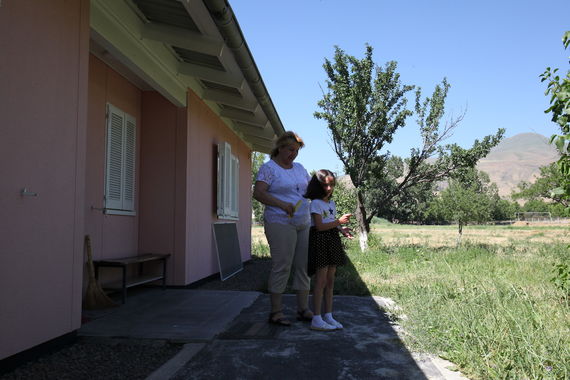
Svetlana combing her daughter’s hair in front of their house.
“When we are on vacation and some of the children visit their biological families, my son becomes restless, keeps asking when we will be going back,” Svetlana says adding that although like all siblings, they sometimes fight and get mad at each other, but that is what family is about. “I remember only one instance when my son got jealous because one of the children who had just joined the family called me mom,” Svetlana explains. “He asked me why is someone else calling me mom? I had a talk with him and also asked the psychologist to speak with him.”
The first children Svetlana cared for were two boys and a girl, they were biological siblings. Then, about a year later, two more boys joined the family, then two more. Svetlana says the first three eventually returned to their biological family.
“Now I have eight children, and I do not differentiate among them,” Svetlana says and adds that she understands on some level that the children, who are her biological son’s age can’t be hers, but with the younger ones, it’s a different story. “I simply can not perceive that I’m not the one who brought them to this world, that is how much I love them. I can’t imagine my life without my small ones,” she explains. Her youngest is about to go to school and while he is the naughty one in the family, he’s also the favorite among all the children.
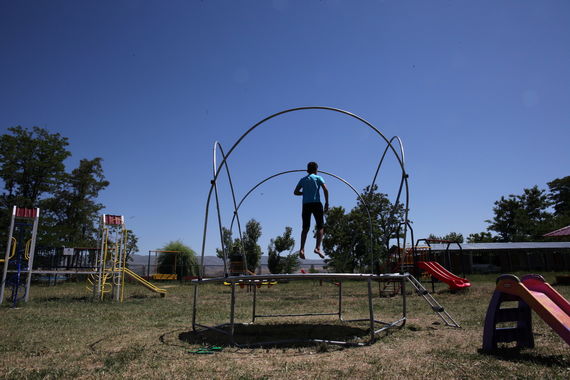
One of the playgrounds at the Kotayk SOS Village.
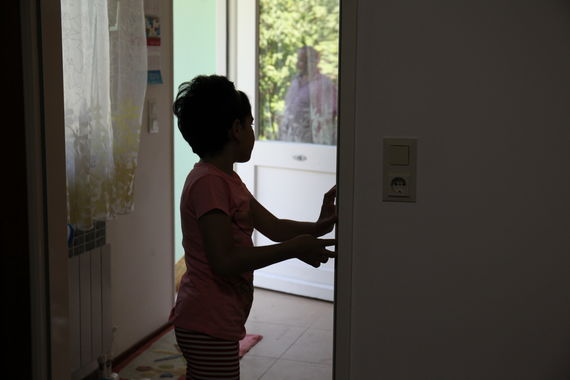
A resident of SOS Village.
The children of the Village often ask Uncle Matso to take them to their house in Abovyan for a chat, mainly regarding “boy stuff,” things they would not want to talk to their mother about. Svetlana says it does not bother her. On the contrary, she’s happy that they have a male figure in their lives since only a handful of families have fathers at the SOS Village and in the majority of cases women raise the children on their own.
“I think the role of the man in the upbringing of children in a family is important,” Svetlana says. “I’m glad my husband agreed to care for these children and now he loves them as his own.” Svetlana’s children are also attentive towards her and Matso. “At the end of a long, tiring day, I look back and understand that I’m blessed to have them.”
Everyone is friendly in this village. Mrs. Sveta visits her neighbors, they drink coffee, talk about their children and every Tuesday and Thursday they go shopping, which in itself is something of a ritual. The children make their requests, who wants what, who needs what like earphones, clothes, a football, a doll…Here, children feel safe to ask for what they want because they know that if it is not something harmful they will surely have it.
About a 100 meters away from Mrs. Sveta’s house there is another SOS mother with many children. Mrs. Anna’s home is impeccable, not a speck of dust to be seen anywhere. She has a collection of intellectual games for her children and they’ve learned that watching cartoons will not help them learn anything new. The children also know that after each shopping trip their mom will bring back a new, more interesting game. She’ll first explain the rules but then she’ll leave them to experiment.
Mrs. Anna has been at SOS for more than 20 years. At first she was an SOS aunt, then she became a mother. It has been five years since, as she half jokingly puts it, that she’s been working as a mother.
“My two youngest children were in the short-term care system initially. I would often see them when walking around the Village, so I knew them,” Mrs. Anna explains. “Last year, we went on a trip to Garni, I already knew then that they were going to be my children, they moved in that day.”
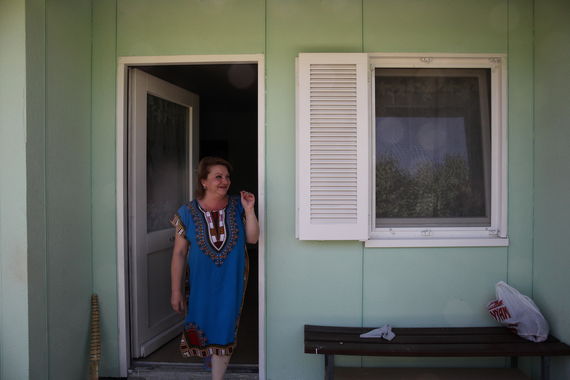
Mrs. Anna at her doorstep.
At the time, Mrs. Anna already had six children under her care and bringing two new children to the fold might have been complicated, however, the children integrated into their new home beautifully. Mrs. Anna says that even biological siblings fight, but they never make a big deal out of nothing. Her family is a harmonious one.
Mrs. Anna’s older daughters are away visiting their biological parents and it’s clear she misses them. “They are my support system, very organized, attentive towards the others, helpful with everything,” she says. “My children have responsibilities. When they are done with homework they can play, go out in the yard but they also have to make sure the house is clean, make their beds, help set the table, be mindful of their personal hygiene, etc.” Mrs. Anna says that sometimes she overhears the children whispering among themselves that she loves them more than their own mothers. Tears well up in her eyes.
Mrs. Anna admits, the job carries immense responsibility, but here mothers are attentive towards their children not because of the salary and the responsibility but because of love.
“Just like anyone else, I too get tired. believe me, it is not easy to raise eight children, but it is worth a thousand tiresome days when the love of a child comes back to you like a boomerang,” she says. “Every night when I put them to bed I believe we’ve had another day that was worthwhile, we got to know one another a little more, accepted each other’s flaws, had arguments, then forgave one another and all of this is the foundation upon which you build strong relationships. There is no shortage of love at our house.”
Mrs. Anna’s story is a slightly different however. Some of the children were there when she arrived, the previous SOS mom had just left her job. The children were used to their previous mother and it was not easy to win their love and trust. But she has.
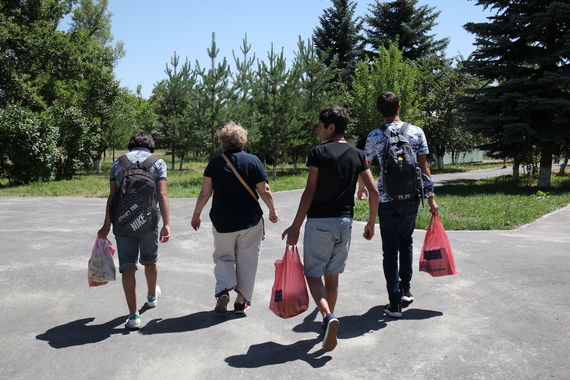
Shopping day.
Mrs. Anna says that her family and friends were supportive of her decision to become a SOS mom to so many children. “My father is especially fond of my younger children,” she says. “He calls sometimes, asks me to take Areg to see him. My friends like to visit us and my children are happy to receive them. We are a family just like any another, there is simply more of us.”
Mrs. Anna is also close to the other moms in the Village, but there is one family in particular that is special because of Vitya. Before becoming a SOS mother, Mrs. Anna was a SOS aunt where she helped care for Vitya. Their house is a couple of meters away. Vitya who is developmentally delayed lives with his siblings and his mother, Mrs. Ira. Upon entering their home, the first thing one notices is the different objects made of clay.
“These are Vitya’s works,” says Edik proudly, who is Vitya’s “brother.” The two went to kindergarten together, then to school and now each is training in a profession of their choosing. Vitya wants to become a car mechanic, Edik, a chef. “There is nothing my mom would not do for us,” Vitya says. “I saw on the Internet yesterday that the new Lion King is coming out soon. I’ve already told her not to plan anything else because we have to go watch it, right mom?
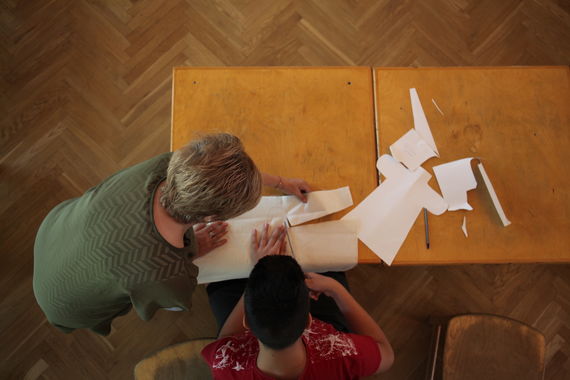
Vitya during his dollmaking class.
Mrs. Ira graduated from the Yerevan Polytechnic Institute and then worked at the “Abovyan Shintrest.” After the institute closed down, she came to work at the SOS Children’s Villages Foundation. Vitya jumps into the conversation: “Then mom became an SOS aunt for three years, and then eventually became our mother.”
Mrs. Ira has had Vitya since he was a year and nine months old. She admits that he was not an easy child, he would not sleep at night, he would not eat and at the time she already had many children in the house. “Then we found out that he has developmental issues.” she explains. “I’ve been through so much, I’ve spent sleepless days and months, how could I not love him, that would be impossible.”
Then it’s Edik’s turn to jump into the conversation. He says that he wants to go to the French-Armenian University to study the culinary arts, but that he will not be going to the youth house. “When you decide to go to Yerevan to study, you go to the SOS youth house,” Edik explains. “You live with others from SOS who are your age. But this year they said we can decide for ourselves if we want to move to Yerevan or commute from the Village. I’ve decided to stay here, I can not leave my family, simply can not, where would I go without them?”
Other than the ten families who live at the Kotayk SOS Children’s Village long-term, there are also homes that host children short-term. The aim is to work with the biological families and return the children to their homes, prevent them from ending up in different specialized institutions. However, it does not always work out that way.
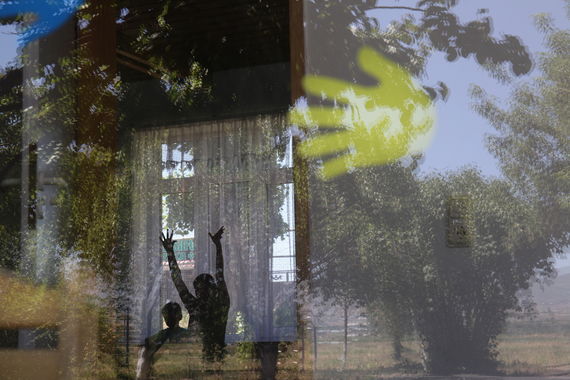
At the SOS Village daycare center, that is also open to children from nearby villages.
Siblings Anna, Nare and Haik [names have been changed] are staying in one of the short-term homes. Their mother passed away two years ago. Anna remembers how their father would come home drunk, swear at them, beat their mother and then them. After their mother’s passing, they suffered their father’s wrath for two more years, but then one day the girls could not take it and called the police.
The children say they are happy at SOS, they do not want to return home. “We have decided that we want to stay here, if it works out,” says Anna. “We do not want to go back to dad. He is our father, but we know that he will drink again, will swear and beat us. Here we have a chance to get an education, we live in a nice environment, we have made friends with the other children.”
It is difficult not to notice the composure of this 15 year-old-girl. It is also impossible not to notice the sadness in her eyes. They miss their mother. The two sisters are warm, but both of them do not open up easily, they keep their emotions to themselves, it must be easier that way. “We decided that our father’s alcoholism, his brutality and the environment of the house should not affect our lives. If he drinks and swears it still does not mean that we should not get an education or become bad people. On the contrary, we should study hard, choose a profession that we like and stay here, make sure they don’t send us back.”
These children know words that children their age should not have to know… words like alcoholism, addiction, testimony, confrontation…it seems a little to much for children who have lost their mother and instead of love and care have only experienced their father’s anger.
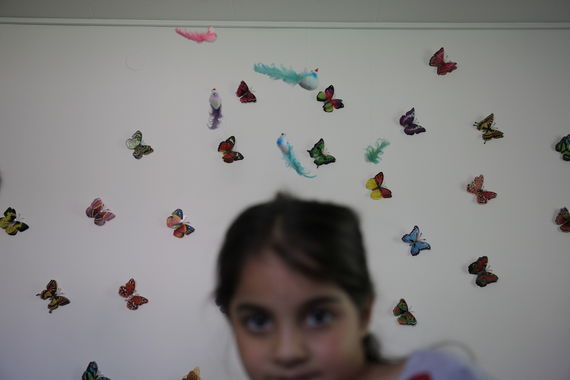
A resident of SOS Village.
This project is funded by the UK Government’s Conflict, Stability and Security Fund.
The opinions expressed are those of the author and do not necessarily reflect the official position of the UK Government.


